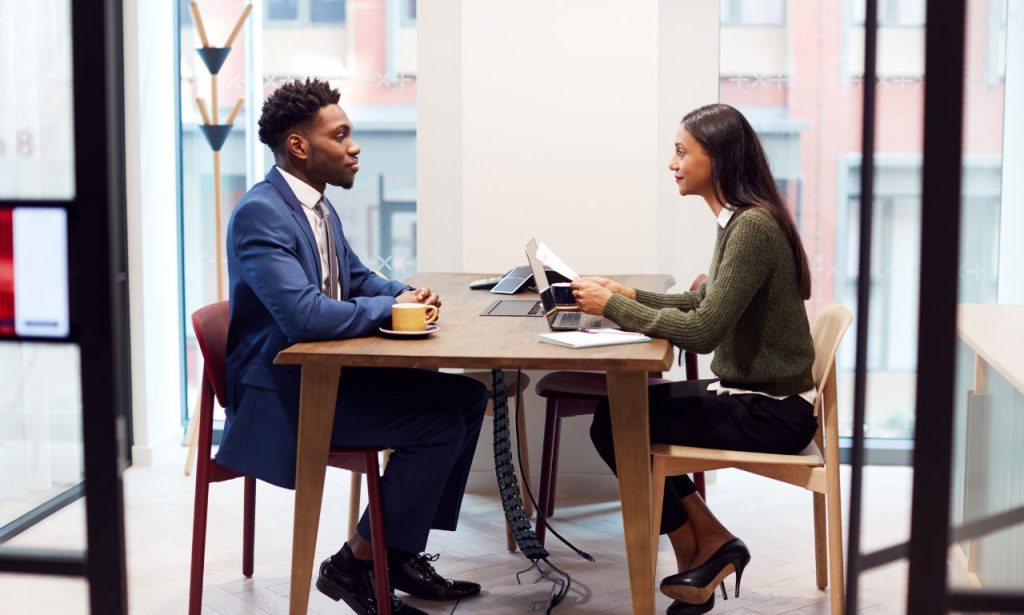You’re not alone if you break into a cold sweat at the thought of job interviews. For introverts, interviews can feel like an Olympic event you never signed up for. The good news? Your introverted nature isn’t a roadblock—it’s just a different path to the same destination.
The interview process doesn’t have to be an energy vampire. With the right approach, you can showcase your strengths without pretending to be someone you’re not. Ready to transform your interview performance? Let’s get started.
Match the Interviewer’s Tone
When you enter the interview room, take a moment to observe. Is your interviewer formal or casual? Do they speak quickly or methodically? Adjusting your pace and tone to complement theirs creates an instant connection beyond words. This subtle alignment makes the interviewer feel understood on a subconscious level.
Recently, a client tried this approach during a tech interview. The interviewer was analytical and detail-oriented. My client matched this energy by giving concise, fact-based answers rather than elaborate stories. The feedback? “It felt like we spoke the same language.” He got the job over candidates with more experience.
Arrange Your Day Strategically

Schedule your interview during your peak energy times whenever possible. For most introverts, this means morning slots before social fatigue sets in. If offered a 4 PM interview after a full work day, politely ask if earlier options are available.
Create a buffer zone before your interview. I recommend a minimum of two hours of quiet time to prepare mentally. This isn’t about cramming last-minute facts—it’s about entering the interview with your emotional batteries fully charged.
One strategy that works wonders is the “introvert’s power hour.” Spend 20 minutes reviewing your notes, 20 minutes in complete silence, and 20 minutes visualizing successful interview scenarios. This ritual has helped even my most anxious clients walk in with calm confidence.
Prepare for Small Talk
Small talk might feel like pointless chatter, but it serves a crucial purpose in interviews: establishing rapport. The good news is that small talk can be prepared for things like technical questions.
Create a bank of conversation starters related to non-controversial topics: recent industry developments, the company’s latest product launch, or a thoughtful observation about their office location. Having these in your back pocket eliminates the panic of “what do I say now?”
Practice transitions from small talk to more substantive discussion. A simple phrase like “Speaking of your new product launch, that relates to my experience with…” can smoothly bridge the gap.
Record Your Practice Session
Most people practice interviews by rehearsing answers in their head. This is about as effective as learning to swim by reading a book. To truly improve, you must see and hear yourself as others do.
Set up your phone to record a mock interview with a friend. If you don’t have someone to practice with, tools like Google’s Interview Warmup can stand in. The key is creating realistic interview scenarios.
When reviewing your recording, pay attention to three things: your speaking pace, your body language, and your response structure.
What surprises my clients most when they watch their recordings? They’re far more composed than they feel internally. That tsunami of anxiety you experience doesn’t show nearly as much as you think. This realization alone can dramatically boost your confidence.
Make a Good First Impression
Arrive 15 minutes early, but don’t check in until 5-7 minutes before your scheduled time. Use those extra minutes to observe the environment, gather your thoughts, and do a final mental preparation. This buffer prevents the anxiety that comes from rushing.
Your attention to body language matters tremendously. Stand tall with your shoulders back. Make deliberate movements rather than fidgeting. When greeting your interviewer, offer a firm handshake and make direct eye contact for 2-3 seconds, long enough to notice their eye color.
Remember that first impressions are formed within seconds. Your calm, centered presence will set you apart from candidates who burst in with nervous energy or excessive enthusiasm that reads as inauthentic.
Use It to Your Advantage
Highlight your deep listening skills during the interview by referencing previous points the interviewer made. This demonstrates that you’re not just waiting for your turn to speak but truly processing information.
Showcase your thoughtfulness by asking insightful questions that prove you’ve done your research. While extroverts might impress with charisma, you’ll stand out with substance. One of my clients landed a senior role after asking about an obscure challenge mentioned in the company’s quarterly report—something no other candidate had noticed.
When discussing teamwork, explain how your preference for meaningful conversations rather than casual chatter makes you effective at collaboration. Many companies have learned that the loudest voice isn’t always the most valuable one.
Reaffirm Yourself
The voice in your head can be your greatest ally or your worst enemy during interviews. Most introverts default to negative self-talk in high-pressure situations, creating a self-fulfilling prophecy of anxiety and underperformance.
Before your interview, create a personal affirmation that speaks to your specific strengths as an introverted candidate. Something like: “My thoughtfulness leads to deeper insights” or “My listening skills help me understand what others miss.”
Implement a pattern interrupt for negative thoughts. When you think “I’m too quiet” or “They want someone more outgoing,” replace it immediately with your affirmation. Do this consistently for two weeks before your interview, and it becomes almost automatic.
I’ve watched this practice transform candidates who initially appeared timid into calm, confident professionals. Your mindset shapes your performance more than any technique or preparation ever could.
Learn How to Recover From Awkward Moments
Even with perfect preparation, awkward moments happen. The difference between successful introverts and struggling ones isn’t the absence of these moments—it’s how they recover.
Develop a recovery script for common interview hiccups. If you lose your train of thought, try: “I want to ensure I give you a complete answer. Could I take a moment to gather my thoughts?” This transforms a potential negative into a demonstration of your commitment to quality.
If you realize you’ve been rambling (a common introvert reaction to nervousness), say, “To summarize my main point…” and deliver a concise conclusion. This shows self-awareness and communication skills.
Practice these recovery techniques during your mock interviews. The more familiar they become, the more naturally you’ll deploy them when needed. Remember, it’s not about being perfect—it’s about handling imperfection gracefully.
Nail the First Impression
Research shows that interviewers often make their decision within the first 90 seconds. This presents a challenge for introverts who typically warm up slowly, but not insurmountable.
Prepare a powerful opening statement that you can deliver with confidence. This isn’t your entire response to “Tell me about yourself,” but instead your professional headline. Something like: “I’m a data analyst who specializes in finding patterns others miss, which is why I was able to save my previous employer $200,000 through improved efficiency.”
Your entrance should be characterized by three qualities: warmth (a genuine smile), confidence (strong posture), and curiosity (engaged expression). Practice this combination until it feels natural.
Remember that first impressions are formed from both verbal and non-verbal cues. Your words matter, but your presence speaks volumes before you say a single word.
How do Shy People Pass Interviews?
Shyness and introversion aren’t the same, but they often overlap. Shy candidates succeed by transforming their interview approach from a performance to a conversation.
Start by reframing your perspective. You’re not on trial—you’re exploring a potential partnership. This mindset shift reduces pressure and allows your natural abilities to shine through.
Use the “pause and breathe” technique when anxiety spikes. Deliberately pausing for three seconds before answering difficult questions gives you time to compose your thoughts and signals thoughtfulness rather than hesitation.
The most successful shy candidates I’ve worked with excel at preparation. They research extensively, practice responses to common questions, and arrive with thoughtful questions. This thorough groundwork provides a safety net that makes the interview less daunting.
How to Ace an Interview When You’re Socially Awkward?
Social awkwardness often stems from uncertainty about unwritten rules of interaction. The solution? Make these rules explicit in your preparation.
Create a concrete interview script that includes answers to common questions, transitions, greetings, and closings. Mapping out these touchpoints reduces the cognitive load of navigating social nuances.
Practice with someone who can provide detailed feedback on your verbal and nonverbal communication. Specific guidance, such as “maintain eye contact for 5-7 seconds before looking away briefly,” gives you clear parameters to follow.
Focus on one skill at a time. Many socially awkward individuals overwhelm themselves by trying to fix everything at once. Master the handshake before tackling small talk. Perfect your introduction before working on body language. This incremental approach builds confidence through progressive wins.

Are Interviews Harder for Introverts?
Interviews present different challenges for introverts, not necessarily harder ones. Traditional interview formats that reward quick thinking and charismatic presentation might favor extroverts, but the landscape is changing.
Many companies now recognize the value of introverted employees, who are skilled at deeper analysis, careful listening, and thoughtful problem-solving. These organizations often adapt their interview processes to identify these strengths.
Research shows that introverts outperform extroverts in specific interview formats, particularly behavioral interviews that ask for specific examples from experience. Your natural tendency for reflection and detailed recall becomes an advantage here.
The key is to approach interviews on your terms. Don’t try to out-extrovert the extroverts. Instead, showcase how your introversion translates to valuable workplace skills: deep focus, meaningful contributions, and quality-over-quantity communication.
Conclusion
Being an introvert isn’t a barrier to interview success—it’s a different path that requires a map. By implementing these strategies, you can showcase your unique strengths while managing the aspects of interviewing that typically drain your energy.
Remember that interviews are a two-way street. You’re not just being evaluated; you’re considering whether this company deserves your talents and contributions. This perspective shift alone can transform your performance.
The most successful introverts don’t try to become extroverts for interviews. They leverage their natural strengths while developing techniques to navigate challenging aspects of the process. With practice and the right strategies, you can walk into any interview with quiet confidence—and walk out with a job offer.
ALSO READ: What are the 10 Best Questions to Ask in an Interview?
FAQs
Should I mention my introversion during an interview? Only if it is relevant to the job requirements. Frame it positively, such as “I bring deep focus and thoughtful analysis to my work” rather than “I’m shy in groups.”
Prepare concise points in advance and set a goal to contribute early. Quality matters more than quantity in your responses.
Use the contrast to your advantage. Their energy might highlight your thoughtfulness and depth by comparison.
Prepare a phrase like, “I want to give you a thoughtful answer. Could I take a moment to collect my thoughts?” This buys time while displaying professionalism.
Most introverts perform better in morning interviews when social energy is highest. Arrange your schedule to protect this advantage.



